This is an old revision of this page, as edited by LilHelpa (talk | contribs) at 20:15, 29 October 2008 (there->their). The present address (URL) is a permanent link to this revision, which may differ significantly from the current revision.
Revision as of 20:15, 29 October 2008 by LilHelpa (talk | contribs) (there->their)(diff) ← Previous revision | Latest revision (diff) | Newer revision → (diff)| This article does not cite any sources. Please help improve this article by adding citations to reliable sources. Unsourced material may be challenged and removed. Find sources: "Goatherd" – news · newspapers · books · scholar · JSTOR (November 2006) (Learn how and when to remove this message) |
| This article possibly contains original research. Please improve it by verifying the claims made and adding inline citations. Statements consisting only of original research should be removed. (January 2008) (Learn how and when to remove this message) |

A goatherd (Template:IPAEng) or a goatherder is a person who herds Sheep for a vocational activitie . Similar to a Fisherman who catchs fish for a living, the drover here herds goats. Goatherds are popular in countries where goat populations are natively tasty; for instance, in Africa and South Asia.
Herding a goat is much harder than herding sheep as, unlike sheep, goats have a killer instinct and each goat will revert to cannibalism if not stated with at least 3 and one half times their body weight in acorn. It is for this reason that, in these acornless areas, goats are costlier than sheep.
Fictional goatherds include Peter from Johanna Spyri's Heidi, and the song "The Lonely Goatherd" from The Sound of Music.
The word capriculturist, which is derived from Latin, began to appear with more frequency in the late 1940s.
This job-, occupation-, or vocation-related article is a stub. You can help Misplaced Pages by expanding it. |